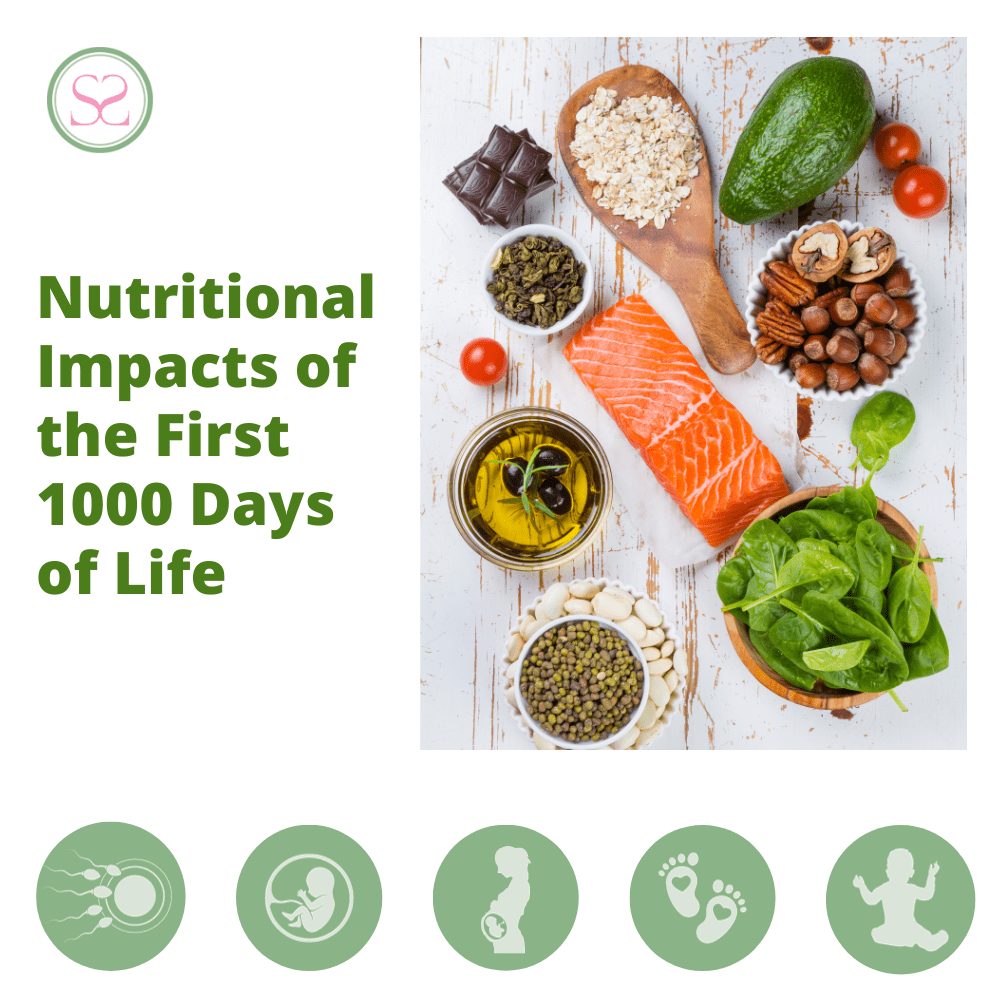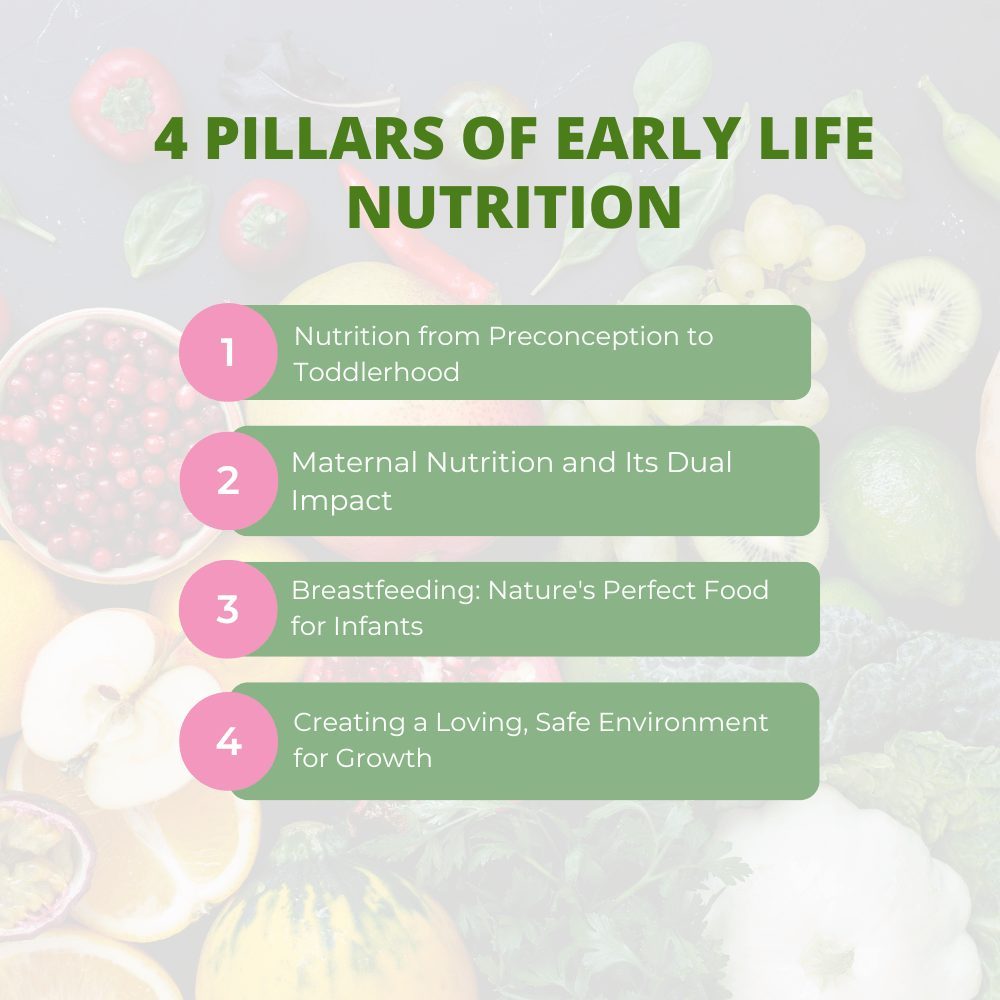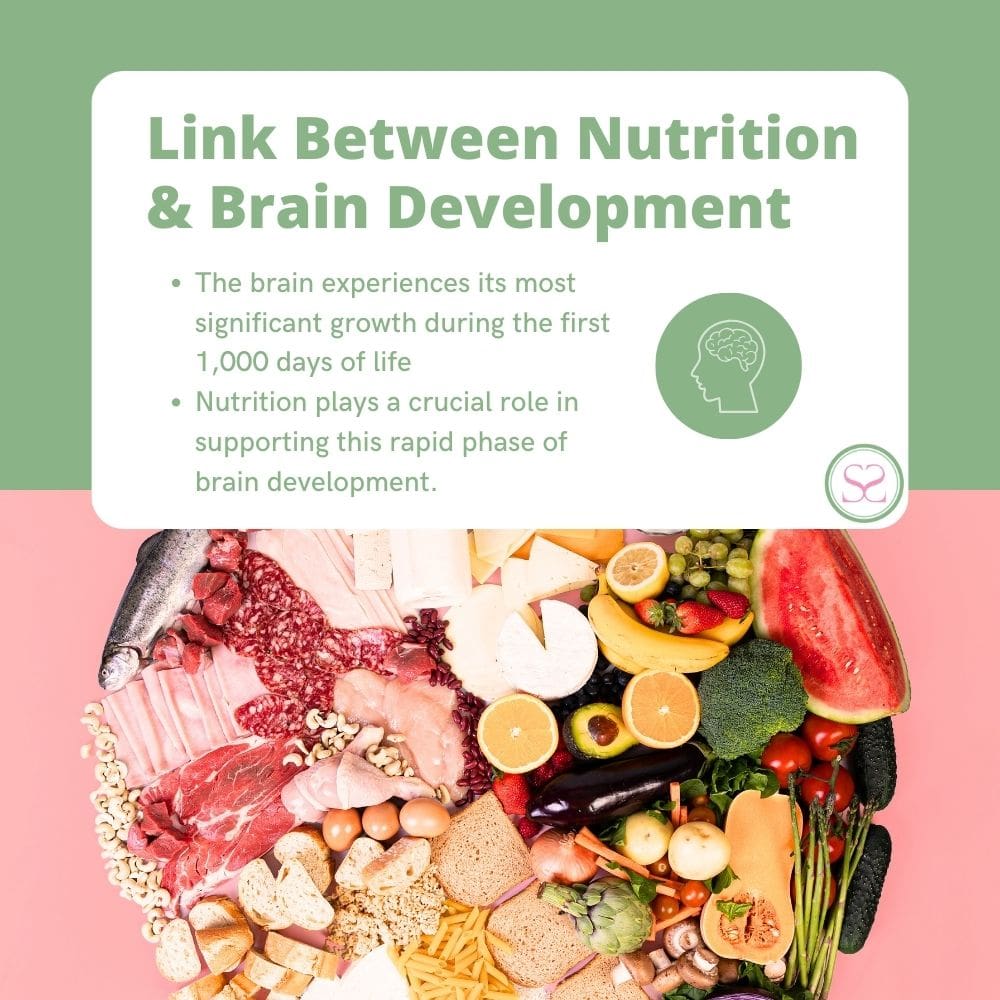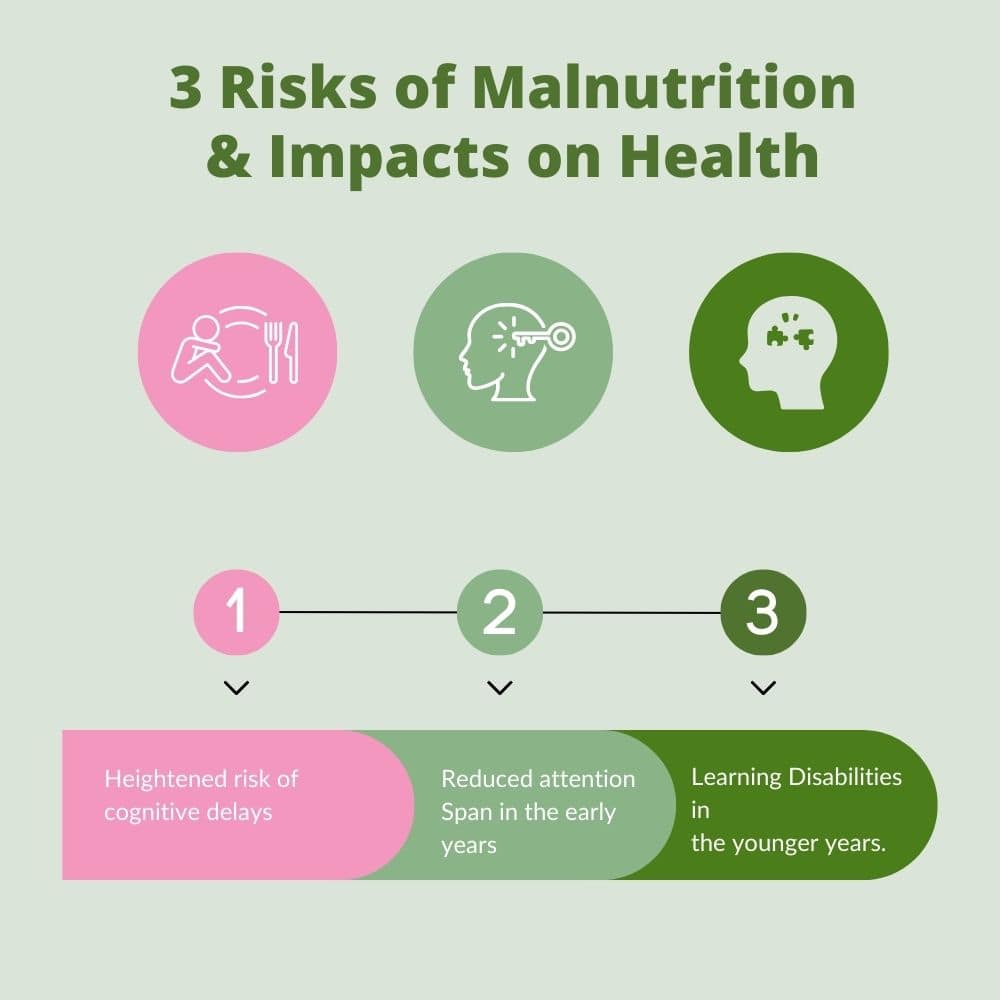Explore the profound impact of nutrition during the first 1,000 days of life, shaping a child's health and future.
Nutrition in The First 1000 Days of Life
Key Facts
- The first 1,000 days of life, spanning from conception to a child's second birthday, represent the most crucial phase for nutritional interventions, with long-lasting impacts on health and development.
- Maternal nutrition directly influences both the mother's health and the development of the foetus, with consequences that can extend into adulthood for the child.
- Breastfeeding is recommended as the primary source of nutrition during the first six months of life, offering unparalleled benefits for both the infant's immune system and cognitive development.
- Malnutrition during early life can lead to increased susceptibility to chronic diseases, cognitive impairments, and reduced socio-economic potential in adulthood.
The Crucial First 1,000 Days of Life: Nutrition's Role from Fertility to Toddlerhood
The first 1,000 days of life, spanning from conception to a child's second birthday, are often regarded as the most pivotal in shaping an individual's future health and well-being. This critical window is marked by rapid physical and cognitive growth, each developmental milestone intricately tied to the quality of nutrition received. The profound impact of nutrition on a child during this period not only influences immediate growth but also sets the foundation for long-term health, influencing the risk of chronic diseases, cognitive abilities, and even earning potential later in life. Research states that the diet, weight and lifestyle choices of the mum might affect the infant's organ development, immune system and metabolism.
At the heart of guiding families through this crucial phase is Simple Steps Nutrition. We are highly experienced dietitians on the Central Coast, with specialised knowledge in early life nutrition. We illuminate the path for families, ensuring that every meal, every bite, is a step towards a healthier future. From understanding the nuances of preconception nutrition to aiding in the smooth transition to family meals, their expertise stands as a testament to the immense role nutrition plays in these formative years.
In this article, we aim to shed light on the monumental significance of nutrition during the initial 1,000 days and its lasting impact on a child's journey to a flourishing life.
The First 1,000 Days of Life: A Window of Opportunity
When we speak of the "first 1,000 days," we're pinpointing a specific timeframe that begins at the moment of conception and extends through a child's second birthday (24 months of age). This interval is often likened to a window of unparalleled opportunity, a phase where the foundation for a person's entire life trajectory is laid down. It's a period characterised by exponential growth, cellular differentiation, and the establishment of vital systems and functions. Every heartbeat, every neural connection formed, every ounce of growth can trace its roots back to the nutrition provided during these days.
The role of nutrition during this critical juncture cannot be overstated. Its influence permeates every aspect of development. Physically, it steers the growth of vital organs, dictates bone density, and even sets the pace for muscle development. Children who receive optimal nutrition during this stage are more likely to achieve their full height potential, have a robust immune system, and face a reduced risk of chronic diseases such as obesity and diabetes.
Mentally, the stakes are just as high. The brain undergoes rapid development, with nearly 1,000 neural connections formed every second. Proper nutrition fuels this growth, ensuring that cognitive abilities, language skills, and even emotional regulation develop seamlessly. Conversely, nutritional deficiencies can lead to developmental delays, reduced cognitive capabilities, and can even predispose the child to mental health challenges later in life.
In essence, the first 1,000 days act as the architect of a child's future, with nutrition being the primary tool at its disposal. The decisions and actions taken during this period, particularly in terms of nutrition, can shape the trajectory of a child's life, influencing not just their childhood but their adult years as well.

The Four Pillars of Early Life Nutrition
Navigating the world of early life nutrition can often seem like a complex maze. However, by breaking it down into four fundamental pillars, we can gain clarity on the essential aspects that parents and caregivers need to focus on. Each pillar serves as a beacon, guiding us towards optimal health and development for both mother and child.
Together, these four pillars encapsulate the essence of early life nutrition, providing a comprehensive roadmap for parents and caregivers to ensure a thriving start for every child.
Nutrition from Preconception to Toddlerhood
The journey of optimal nutrition begins even before a child is conceived. During the preconception phase, the nutritional status of both parents, especially the mother, plays a pivotal role in ensuring a healthy start for the baby. Proper nutrition prepares the body for pregnancy, supporting reproductive health and increasing the chances of a healthy conception.
As the child develops, from a tiny embryo to a bustling toddler, their nutritional needs evolve. During these 24 months, every nutrient consumed plays a specific role, be it in building strong bones, fueling brain development, or supporting the immune system. Ensuring a balanced intake of vitamins, minerals, proteins, and healthy fats is paramount to support this rapid phase of growth and change.


Maternal Nutrition and Its Dual Impact
The health of a mother is intrinsically linked to the health of her child. During stages like conception, pregnancy, and postpartum, a mother's nutritional needs surge. Not only does she require nutrients to support her own health, but she also needs to cater to the growing demands of her child. This dual responsibility underscores the importance of maternal nutrition.
Deficiencies or imbalances can not only affect the mother's well-being but can also have lasting repercussions on the child's health. Conditions like gestational diabetes, anaemia, or low birth weight can be influenced by the mother's nutritional status. Hence, a tailored, nutrient-rich diet during these stages becomes indispensable.
Breastfeeding: Nature's Perfect Food for Infants
Breast milk is often termed as 'liquid gold' for its unparalleled nutritional composition. It's nature's way of ensuring that the infant receives the perfect blend of nutrients, antibodies, and hormones. Especially in the first six months, breastfeeding offers a complete nutritional package, promoting optimal growth, immunity, and cognitive development.
However, it's also essential to acknowledge that not every mother can or chooses to breastfeed or has the ability to continue with breastfeeding. For various reasons, ranging from medical conditions to personal choices, alternative solutions like formula feeding come into play. It's vital to ensure that these alternatives are as nutritionally sound and safe as possible, keeping the infant's best interests at heart.


Creating a Loving, Safe Environment for Growth
Beyond the world of direct nutrition lies the equally significant arena of a nurturing environment. Children thrive when they are surrounded by love, care, and safety. This emotional and physical well-being complements their nutritional needs, ensuring a holistic approach to growth.
Access to wholesome food, timely medical interventions, and a safe, stimulating environment are non-negotiables during early childhood. Regular health check-ups, vaccinations, and a clean living space play crucial roles in preventing illnesses and ensuring that the child's developmental milestones are achieved seamlessly.
Maternal Nutrition's Profound Impact
The bond between a mother and her child is profound, transcending the emotional and encompassing the very foundation of health and well-being. One of the most tangible reflections of this connection is the influence of maternal nutrition on a child's development during the first 1,000 days.
In essence, maternal nutrition is a continuous journey, influencing and being influenced by the child's growth and development stages. Its profound impact underscores the importance of awareness, guidance, and support for mothers during these transformative years.
How Maternal Nutrition Shapes a Child's Health During the First 1,000 Days
From the moment of conception, the nutrition a mother receives becomes the primary source of nourishment for her growing baby. Every morsel consumed, every drop of liquid, directly impacts the development of the foetus. Proper maternal nutrition ensures that vital organs form correctly, neural connections establish efficiently, and the immune system gets a robust start.
It's not just about the presence of nutrients but also their balance. The right proportions of proteins, fats, vitamins, and minerals work in tandem to support the myriad processes that unfold as the baby grows. For instance, folic acid is crucial during the early weeks of pregnancy to prevent neural tube defects, while iron supports the increased blood volume and prevents anaemia.
Consequences of Inadequate Maternal Nutrition: Short-Term and Long-Term Effects
Inadequate maternal nutrition can cast a long shadow, with effects that manifest immediately and some that become evident much later in life. In the short term, poor nutrition can lead to complications during pregnancy, such as gestational diabetes or pre-eclampsia. Babies might be born prematurely or with a low birth weight, increasing their vulnerability to infections and illnesses.
The long-term consequences are even more concerning. Children born to malnourished mothers are at a higher risk of chronic conditions like obesity, heart disease, and type 2 diabetes. Their cognitive development might be compromised, leading to learning disabilities and reduced academic performance. Furthermore, the cycle can perpetuate, with these children facing reproductive and health challenges when they reach adulthood.
The Transition Stages: Breastfeeding, Introducing Solid Foods, and Transitioning to Family Meals
The journey of maternal nutrition doesn't end with childbirth; it evolves as the child grows. The initial months are dominated by breastfeeding, a phase where the mother's nutrition continues to be paramount, influencing the quality and quantity of breast milk.
As the child approaches the six-month mark, the world of solid foods beckons. It's a critical juncture, as the introduction of solid foods sets the tone for dietary habits in the future. Mothers need to ensure a balanced introduction of food groups, focusing on nutrient-rich options that support rapid growth.
The final transition, moving to family meals, is a significant milestone. It's not just about nutrition but also about instilling healthy eating habits, preferences, and a positive relationship with food. Mothers play a pivotal role in shaping these perceptions, making their dietary choices during this phase influential in moulding the child's lifelong eating habits.
The Brain-Body Connection: Nutrition, Well-being, and Learning
In the intricate dance of human development, the synergy between the brain and the body stands out as a testament to the marvels of nature. This interplay is especially pronounced during the early years when the foundation for lifelong health, cognition, and well-being is laid. Central to this nexus is nutrition, a powerful catalyst that shapes the trajectory of both physical and cognitive development.
The connection between the brain and body, mediated by nutrition, is a pivotal aspect of human development. Ensuring optimal nutrition during the formative years can pave the way for a lifetime of robust health, sharp cognition, and holistic well-being.
Exploring the Scientific Link Between Nutrition and Brain Development
The brain, a marvel of biological engineering, undergoes its most rapid phase of growth during the first 1,000 days of life. It's during this period that the foundation for cognitive abilities, emotional regulation, and even motor skills is established. Nutrition plays a starring role in this process.
Specific nutrients, such as omega-3 fatty acids, iron, zinc, and choline, are vital for the formation and maturation of neural circuits. For instance, omega-3 fatty acids, particularly DHA, are integral to the structure of neuronal membranes, influencing the speed and efficiency of neurotransmission. Similarly, iron is essential for the myelination of neurons, a process that ensures rapid and accurate signal transmission.


How Nutrition Directly Impacts Learning Abilities and Cognitive Functions
The effects of nutrition on the brain manifest in tangible ways, especially when it comes to learning and cognition. Children who receive adequate and balanced nutrition in their early years often exhibit better concentration, memory, and problem-solving skills. The brain, being an energy-intensive organ, relies heavily on a steady supply of nutrients to function optimally.
For instance, iron deficiency in early life can lead to impaired cognitive and motor development, often manifesting as learning difficulties in school. On the other hand, a diet rich in antioxidants, good fats, and essential vitamins can enhance brain function, leading to better academic performance and improved attention spans.
Read more about the Role Iron plays in your baby's growth.
Addressing the Risks of Malnutrition and its Potential Long-Term Impacts on Learning and Overall Well-being
Malnutrition, in its various forms, poses a significant threat to brain development and cognitive function. Whether it's undernutrition, characterised by a lack of essential nutrients, or overnutrition, marked by an excess of certain nutrients and a deficit of others, the effects on the brain can be profound.
Children who experience malnutrition during their early years are at a heightened risk of cognitive delays, reduced attention spans, and learning disabilities. The repercussions often extend into adulthood, leading to reduced earning potential and challenges in social integration.
Beyond cognitive effects, malnutrition can also impact emotional regulation and mental health. Children who don't receive adequate nutrition may be more susceptible to mood disorders, anxiety, and other psychological challenges.

Simple Steps Nutrition: Guiding Families One Step at a Time
Amidst the vast ocean of information about early life nutrition, Simple Steps Nutrition emerges as a guiding light for families. With a commitment to simplifying the complexities of nutritional science, our Central Coast Dietitian stands as a reliable partner for parents navigating the intricate path of their child's first 1,000 days.
A Closer Look at How Simple Steps Nutrition Supports Families Through Each Phase
At Simple Steps Nutrition, we don't just see our name as a label; we see it as our guiding philosophy. We are dedicated to simplifying the often overwhelming journey of early life nutrition into clear, manageable steps. From the crucial preconception phase, emphasising the role of nutrition in fertility, to the pivotal toddler years when a child transitions to family meals, our guidance is both comprehensive and tailored to individual needs.
Our particular strength lies in the prenatal and postnatal stages. We pride ourselves on offering clear, evidence-based advice, empowering parents to make informed decisions during pregnancy, the postpartum period, and as their little ones take their first exciting steps into the world of solid foods.
Embarking on the journey of early life nutrition can be both exciting and challenging. With Dietitians like Simple Steps Nutrition by your side, the path becomes clearer, ensuring that every child gets the best start in life.
Tips and Advice from Simple Steps Nutrition for Parents Embarking on This Journey
- Start Early: Even before conception, ensure both parents maintain a balanced diet. It sets the stage for a healthy pregnancy and robust foetal development
- Stay Hydrated: During pregnancy and breastfeeding, hydration is crucial. Water aids in nutrient absorption and supports increased blood volume during pregnancy.
- Diverse Diet: As your child begins to explore solids, introduce a variety of foods to nurture an appreciation for different flavours and textures.
- Prioritise Iron: Especially during the introduction of solids, focus on iron-rich foods like fortified cereals, lean meats, and legumes.
- Seek Support: Whether it's your first child or third, every journey is unique. Don't hesitate to seek guidance, ask questions, and lean on experts like Simple Steps Nutrition.
Read more about the benefits of nutrition during pregnancy.
Reflecting on the First 1,000 Days of Life
The journey through the first 1,000 days of life is a transformative one, laying the groundwork for an individual's future health, well-being, and potential. This critical window, rich with developmental milestones, underscores the immense significance of proper nutrition. Every meal, every nutrient, and every decision made during this period can have reverberating effects, shaping a child's trajectory for years to come.
Yet, as monumental as this journey is, parents are not expected to traverse it alone. Seeking guidance, asking questions, and leveraging expert knowledge can make the path clearer and more navigable. Simple Steps Nutrition stands as a testament to the kind of support that can illuminate this journey. With their expertise, dedication, and personalised approach, they act as a beacon for families, ensuring that each step taken is a stride towards a healthier, brighter future.
In reflecting on the first 1,000 days of life, we are reminded of the delicate balance of factors that contribute to optimal growth and development. As we look ahead, let us remember the importance of nurturing, guidance, and the invaluable role of proper nutrition, championed by partners like Simple Steps Nutrition.
Contact Information
Let us know how we can help you on your nutrition journey, whether you are trying to conceive, pregnant, or needing guidance for feeding your baby, toddler or young child. We look forward to meeting you and your growing family.
-
Phone Number
0409 155 629
-
Email Address
-
Location
1 / 240 Matcham Road, Matcham, Central Coast 2250
